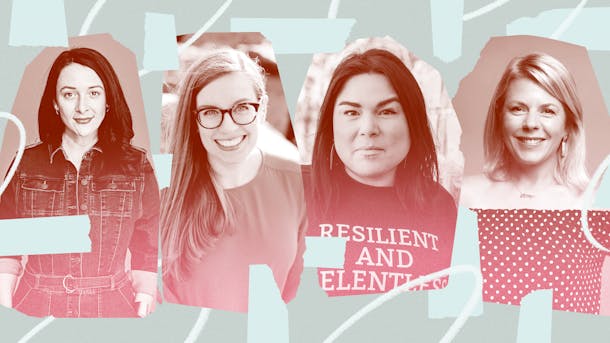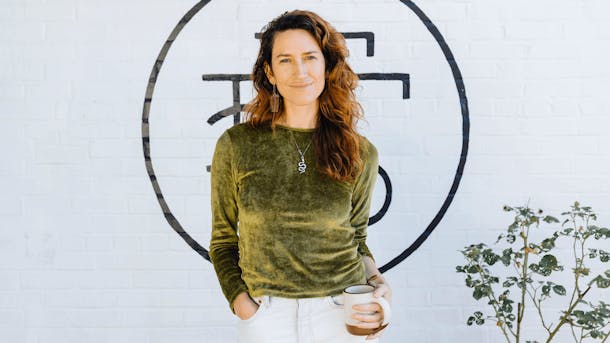
Feature Story
The learning never stops: A founder-to-founder conversation about staying curious
The co-founders of Help Scout interviewed one another about all they’ve learned — and are still learning — while growing a business together.
Co-founders Nick Francis, Jared McDaniel, and Denny Swindle go way back, and it shows. The CEO, director of product design, and CTO, respectively, have a candid and easy dynamic in conversation — the kind of vibe that’s been more than a decade in the making. But their roles and relationships with one another have changed drastically and often across their 12 years of building Help Scout, the customer communication platform for growing businesses.
Even through the ebbs and flows, there have been a few constants — like investing in customer-centric values, building an inclusive team culture, existing for profit and purpose, and committing to ongoing learning as a founder team and an organization at large.
To hear their take on creating a culture of curiosity and learning for themselves and their teams, we set Nick, Jared, and Denny loose on a Zoom interview — with one another. The result was an honest reflection on the lessons, the highs, and the lows of growing a company and “getting paid to learn things,” as Nick puts it.
Here’s what they had to say, founder-to-founder.
Nick: Let’s start with this — what is the hardest thing you’ve had to learn as a co-founder of Help Scout over the last 12-plus years?
Jared: This question just makes me reflect on how much work goes into building something that's truly long term, as opposed to just trying to get something off the ground and sell it for an exit. Of course I know there’s lots of work wrapped up in that process, too. But learning the amount of work it takes to build something that's unique — that will last beyond the three of us — is something that continues to be hard.
For 12 years we’ve been asking, “How can we continue to innovate? How do we continue to create a brand that resonates with people, that’s unique in the market?” It’s been a lot. And I can't say that, going into this, I knew it would be as challenging as it has been.
Denny: The first thing that comes to my mind is learning just how much of our jobs would change over the years. I don't know about you all, but for me, the role that I had 12 years ago is not the same role I have now. Some of the technical work is the same, but my day-to-day work is so vastly different. In the beginning, we wore so many different hats. But today, the work I do is much more specialized since we have so many other people on the team. That feels really different from where we started.
Nick: Yeah. Actually my answer to this touches on things that each of you brought up. I’ve been attached to this metaphor most recently that growing a business is kind of like defying gravity — the higher you go, the harder it gets. And there’s no milestone at which it gets easier. It's always harder — every single day. I think even if we knew that 12 years ago, we'd still be doing what we're doing. We're attracted to hard things.
That also relates to what you brought up, Denny — that idea of wearing different hats and seeing our roles evolve. Our personal rates of growth have had to exceed that of the company, or the company would’ve passed us by. Each of us has probably had, what, seven different job descriptions over the years? And again, I think that's something we still would’ve willingly opted into had we known — but it's definitely been the hardest part.

Growing a business is kind of like defying gravity — the higher you go, the harder it gets. And there’s no milestone at which it gets easier.
Jared: What’s something essential that you feel like you had to learn as a people leader at the company?
Nick: I can go first here because my guess is that what I’m thinking of will resonate for both of you. If you think back to the very early days and what we were worst at — we were so bad at hiring. We had no idea how to build a team or how to look for certain values in people. And man, we made so many early mistakes in those first few years. To this day, we’re still learning a lot about building accountability into the business. We still have challenges with that.
I think we came into the business already pretty good at making products. We knew how to make a good product and we would continue to excel in that craft. But learning the craft of building a company and hiring people and leading those people — that was a challenge.
Jared: I agree. I’ve learned a lot about creating trust and a culture of autonomy. I’ve learned how to say, “Hey, I trust you to make a call on that” — and to just let go and let people make their own mistakes. It can be a tough balance to make sure you're properly coaching people, you're setting high expectations, and you're holding folks accountable and trusting them. That's hard.
Nick: Yeah — learning to watch people make the same mistakes that you've made is tough.
Denny: I'm not a natural people leader, so for me, learning the nuances of talking to people on my team has been essential. I’ve had to learn to be aware of how I speak to team members and how the words I use make an impact. That’s something I'm still having to learn every day.
Jared: Two other tactical skills that come to mind for me in terms of things I’ve had to learn are storytelling and writing. I think those two skills have become even more important as we've scaled — in order to create alignment and excitement. And it’s really hard! I know we’ve always talked about the value of writing, but as we've leaned into showing our work and bringing other people along, it’s become more important. I think writing is actually one of the top skills that we should hire for.
Nick: Yeah. I love that.
Denny: What are some of the ways we've learned to work better as a co-founding team?
Nick: I was thinking recently about a time pretty early on — I think it was 8 years ago — when we just weren't communicating very well. We didn’t understand then, as co-founders, how important it was to let one another in on every bit of information that's happening in the business. But we came away from that period of time with the practice of the three of us meeting for an hour on a regular basis, and that practice has continued to this day.
That regular meeting is a venue, for me, where I can transparently share what’s happening in the business — things that nobody else really knows. Even as we’ve grown, you can’t look at some org chart and try to cascade communication down. It doesn't work that way for a co-founding team. That was a big learning for me: You have to break some rules of standard company communication in order for a co-founding relationship to continue to work and scale as the business grows.
Jared: Yes. I'd underscore that investing in and honoring our co-founder relationship is so important — and being intentional about sharing things that may cross boundaries, given our roles.
Nick: Yes. Our relationship comes first, and I had to learn that.
Nick: What have you learned while growing this business that you wish you knew 12 years ago?
Jared: I've reflected a lot recently about staying true to who we are. For better or worse, we’ve sometimes experimented with alternate directions for the company over the years, which ultimately took us a bit further from our core competencies and the things we’re good at: getting our hands dirty and caring a lot about what we do and what we make. We do better when we stay true to our roots.
Nick: That's a great one. If there's anything I would tell myself 12 years ago, it would be to stick to our principles. I’d say that a lot of business “best practices” — growth hacks and rules about how to grow a business — are overrated. It’s all bullshit. If it doesn't feel authentic, if it doesn't feel like you can do something the right way, it's probably not worth doing. We've been distracted by so many best practices that, for whatever reason, just didn't really work for us.

There’s a thin line between being principled and being stubborn. We certainly wouldn’t want to build a stubborn company, but we want to be principled about the things that we say no to and the things that we think we're good at.
Jared: Who outside of Help Scout have you learned the most from?
Denny: Well, my family still doesn't even know what I do, so it definitely wouldn't be them. We have had a few mentors who have taught us a lot about business, but, for me, it’s friends and peers working in the same space.
Nick: I’ve had some great coaches along the way, which has been really valuable — especially because, as I remind myself, we’re all doing this for the first time. I'm actually a first-time CEO; Denny's a first-time CTO; Jared's a first time design leader. On some level, you need somebody who’s helping you see your own corners.
I also have so many amazing CEO friends I get to call on whenever I have an issue. Matt Blumberg is that person for me right now. He’s built a $100M business over the course of about 14 years. He did it while really investing in his team and culture. I learn so much from people like Matt and their experiences leading companies.
Jared: I’m so grateful that we have the resources to invest in coaching. I’ve been seeing the same leadership coach for over two years now, and it’s been super valuable. Also, I'm intentional about having friends outside of work who have no freaking clue what I do.
These are people who are entrepreneurs or who run their own businesses, and I can pick their brains about how they do things and why. Hearing from other folks about how they approach and overcome challenges in whatever business they’re in is great. I love talking to people who are working hard; it doesn't necessarily have to be in the same business we’re in.
Nick: Curiosity's a big superpower for you. You have a genuine interest in how other people tick, what other people do, and why they do it.
Jared: Maybe it's just insecurity that forces me to ask people questions so I don't have to talk.
Nick: Whatever the motivation, you're using it for good.
Jared: What are your favorite sources for ongoing learning? I already know Nick’s going to put us to shame on this topic.
Nick: Ha, well, yeah, I do a lot of reading. But everybody learns differently! I was a shitty student. I don't learn in the classroom. I've always learned by doing — and by starting companies. That's really how we started working together, right? We all started a company just so we could learn the craft of building things for the web before we tried to build a software company. I’ve always thought it’s just way better to get paid to learn things. And that's still what I think all three of us are doing — getting paid to learn things.
But for me, today, ongoing learning happens most through reading.
Jared: Where do you get your reading list from?
Nick: I keep a really long Amazon wishlist, and every time I talk to somebody who mentions a book, it goes on the list. So I’ve got this incredible list going — I think there are probably hundreds of books that I haven’t yet read on that list. I could easily read a book a week if I had the time.
Jared: What's your reading practice? Do you finish a book before you start another one? Do you have 10 books that you're reading at once?
Nick: I'll usually have two books going at the same time: one that's fun, and one that’s more business-related. I read memoirs and non-fiction; I don't really do any fiction. So I might read a book about race driving, but I’ll also be reading a book about running a business.
I don't know if either of you have picked this one up yet, but right now I’m reading the most inspiring book on creativity I've ever read, by far. It’s called The Creative Act, by Rick Rubin. It’s unbelievable. Every word is so carefully crafted. It’s the most legendary music producer in the history of our planet just talking about what it means to explore the edges of creativity. It’s a little bit philosophical and abstract, but I think it's beautiful and I've learned a lot from it.
Denny: What's one thing you've learned by reading this book?
Nick: I'll just read you an excerpt.
Jared (sighs): Sit back, grab a drink, Denny.
Nick: “Living life as an artist is a practice. You are either engaging in the practice or you’re not. It makes no sense to say you’re not good at it. It’s like saying, ‘I’m not good at being a monk.’ You are either living as a monk or you’re not. We tend to think of the artist’s work as the output. The real work of the artist is a way of being in the world.”
If you read that a few times and just let it sink in, it's an incredibly interesting perspective. There are a lot of people who say things like, “Oh, I can't write.” Well, we're all writers. It's just a matter of how much you want to put into the craft.
Help desk software for customer-centric founders
Help Scout’s platform is easy to start and built to scale as your business grows.
Free 15-day Trial
Nick: What should colleges or schools be teaching students today that they aren't? Where are our learning gaps as a society?
Denny: I feel like high schools should be teaching basic financial literacy — how to balance a checkbook, how to buy a house, the different types of verbiage in a loan or a mortgage application. When I first had to do those things, it was so damn daunting.
Nick: Yeah. It's wild to me that we don’t teach more life skills — basic nutrition and diet and exercise, for instance. Let's sub out dodgeball and learn a little bit about nutrition.
Jared: I've been lucky to be a mentor for entrepreneurship programs at a couple of schools, and I loved that. I had nothing like it in high school. It’s the best way to learn about problem solving.
I don't think there's enough openness to fail in school. It's all about getting the right answer, getting the best grades. Well, shit, I fail every single day in this job, but I learn and it makes me better. Can we grow an appreciation for learning through failure, and what does that curriculum or program look like?
Nick: Yeah. That's a great answer. I love that. Grades are overrated — or maybe I just say that because I was a C student.

I don't think there's enough openness to fail in school. It's all about getting the right answer, getting the best grades. Well, shit, I fail every single day in this job, but I learn and it makes me better.
Jared: What are you learning about right now to get better at your job?
Denny: I'm trying to learn more about AI at the moment. I’m not doing any hands-on coding, but I'm trying to read and learn as much as I can so that I can talk to the team about when to use or not use it.
Nick: I'm reading a book called Crucial Accountability right now. In my role, given I'm not at risk of losing my job, accountability can be a really difficult thing. For me, it's about creating a culture of accountability in our organization and, man, it's so difficult. We’ve gotten feedback from various assessments that it’s an area we need to improve, but it’s not easy. So I’m working on learning more about the topic generally so I can improve in that skill in order to address it.
Jared: For the last few months, I've been kind of obsessing about how we can inject and really operationalize innovation. How, in this culture of shipping and iterating and shipping again, can we invest in big-picture thinking for the long term and chase those opportunities?
Denny: What do you make an effort to learn about that's not related to work or Help Scout?
Jared: So, when I'm at work, I'm all in. And it does bleed into my life outside of work — most nights, I've got the laptop open. But when I'm not working, I care deeply about working with my hands. Y'all know this about me: Any opportunity I have to build cabinets or built-ins, fix some drywall, or watch a video about building or fixing something — I’m there.
And for me, it’s the feedback loop of that work that I love. In our work of building the company, we live in a world where that feedback loop is longer and longer. So if I can get a shorter feedback loop somehow — through a house project over a weekend — I love that. Because it has nothing to do with work and it gives me a little bit of an escape.
Denny: For me, it’s similar — outside of work, I’m mostly learning about homeowner stuff. A couple of weeks ago, I replaced all of my fire alarms. They're all electric, so I had to learn how to do all the wiring. That was all foreign to me and I was shaking the whole time, but I got it done and it's all working. I feel very accomplished.
Nick: You're a pretty serious cook, too.
Denny: Yeah, I do like to cook. I’m trying to explore more healthy eating options nowadays, so I’m focused on that.
Nick: Going back to what you said, Jared, the concept of quick feedback loops has been one of the most important insights I've experienced — the value of being able to do something, do it well, and instantly get satisfaction from the work that you just did.
It can be so much more difficult to understand feedback in a business that has so many different moving pieces. On some level, I think we can all be proud of what we've built, but the feedback doesn't feel the same as it does when you build, fix, or do something with your hands.
For me, that’s usually in the context of a car — I’m either detailing one or driving one. I also have a racing permit, and that’s the ultimate sort of feedback loop for me because when I go one lap around a track — even if I’m not racing anybody — I get a hundred pieces of feedback in a minute and a half on what I did right and what I did wrong and what I can do better. I'm just addicted to that. You get so much data coming at you really fast. You can't afford to think of anything else.
Nick: What hobby or experience outside of work catches your attention or says something interesting about a person you’re considering hiring?
Denny: I get excited anytime I see somebody in the engineering field using a creative avenue of their brain — learning music or writing or art. I also think seeing that someone volunteers is interesting.
Nick: I ask this question a lot in interviews: “What do you do outside of work?” And what I'm typically looking for is a desire for mastery in something that's not necessarily related to making money. I love to see that someone is just borderline obsessive about being really good at something or understanding something. That speaks to a level of curiosity, and I think what you can accomplish in life is highly correlated with how curious you are.
Have y’all ever watched the documentary about Bill Gates, “Inside Bill’s Brain”?
Denny: It’s amazing.
Nick: I realized how insatiably curious he is, and that's what makes his capacity for knowledge and for learning so incredible. When you find that kind of curiosity in a high-performing teammate, it makes all the difference. And I do think it’s something that you can interview for. David Cancel would always say: “Can you get them to light up in the interview? Can you get them really juiced about something, and what is that thing?”
Jared: Yeah. I'm looking for an obsession about something. I want to know, “What are your strong opinions? Like Wistia’s podcast, what gets you talking too loud?” That’s what I'm trying to unpack in an interview.
I like to see if somebody has been in leadership and is now wanting to get back to craft. I think those leadership qualities can show up in really good ways as an individual contributor. But in terms of a hobby, I just want to learn what you care about. Are you someone who has an opinion?

Our intuition does not tell us to do hard things or to do things that feel uncomfortable, so I constantly have to work at it.
Denny: How does a commitment to ongoing learning take you out of your comfort zone?
Nick: I think we should be forcing ourselves to do something uncomfortable on a pretty regular basis. I've started to think very consciously about that and to consider how it makes me feel afterward. I realize that every time I do something that feels incredibly uncomfortable, by the end of it, I'm just so proud and so excited that I was able to make my way through the curve.
Jared: I don't know about you guys, but there has not been a week over the last 12 years where I have felt comfortable at Help Scout. I feel like I am stretched constantly. And I love it. That's why I'm still here, and that's why we show up. It loses its fun, its luster, when it's easy or expected. There’s no better journey to be on than this one.
Nick: Right? Well, I think that's the case for building a long-term business. As far as I can tell, we still get paid to learn at a very high rate and be challenged at a very high level. To be able to do that for 12+ years is such a privilege.

I am stretched constantly. And I love it. That's why I'm still here, and that's why we show up. There’s no better journey to be on than this one.



